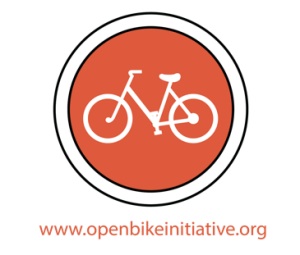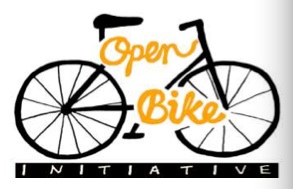
Employees at Hillsboro-based Intel Corporation are spearheading an effort to make bike sharing less expensive and more widely available. Using their own volunteer time, a group of employees at the company have been working on the Open Bike Initiative since January. I’ve heard murmurs about the effort for months and they just released some bare-bones details at OpenBikeInitiative.org.
Key advisors on the Open Bike project include Nike, the Westside Transportation Alliance, the Community Cycling Center, Portland State University, and the Bicycle Transportation Alliance.
According to the website, the main objective of the effort is to design a low-cost device that incorporates GPS/cell data and a locking mechanism that can be attached to any standard, off-the-shelf bike. Then they’ll create software that allows the bikes to communicate and be managed as a system via an online portal. The final step will be to freely distribute the results of their work and experiences with an open-source license.
Intel’s motivation is clear: Some buildings on their sprawling Hillsboro campus are over 3.5 miles apart. That’s too far to walk and the perfect distance for a bicycle ride. Here’s more from the Open Bike site:
If successful, the project could provide a template for a new bike sharing model that could be implemented (relatively) easily and (relatively) inexpensively, even by small organizations. Most current bike sharing programs utilize expensive kiosks and costly custom bicycles, and require services from a single vendor. The few emerging “smart lock” based systems eliminate the need for kiosks, but continue to use custom bicycles and proprietary software and services from a specific vendor. This project envisions a model that utilizes standard bikes with minor “do it yourself” modifications and free software. Organizations like corporations, university campuses, housing projects and the like may be able to implement a bike sharing program completely on their own, or new vendors may emerge to supply particular components (e.g., bicycles, control devices, software management, load balancing and maintenance services, etc.). Our hope is that this will result in a significant increase in the number of bike sharing programs, with corresponding environmental, health and economic benefits.
On July 8th, Intel plans to launch a pilot implementation of the system with 30 bicycles on their Ronler Acres and Hawthorne Farms campuses in Hillsboro. They expect to have the technology “fully functioning” by late this summer.
Will this disrupt the current bike share market? Can it work on a larger scale? Stay tuned for more on this exciting project. I’m planning to visit Intel tomorrow for an exclusive look at the science and the people behind the initiative.

